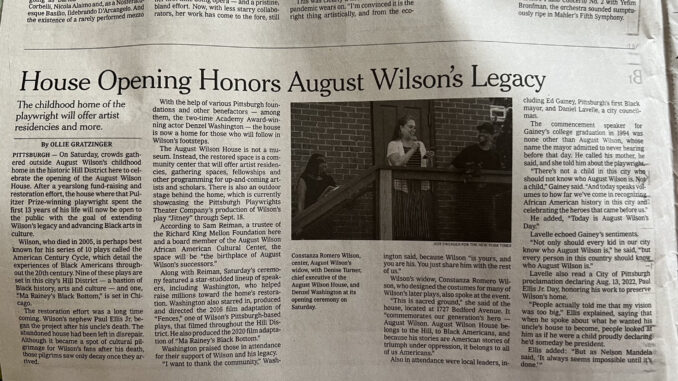
Isabella Abbott | Features Editor
Sept. 22, 2022
Duquesne University graduate Ollie Gratzinger earned a significant achievement last month, when he got his first byline in The New York Times.
His story about the opening of the August Wilson House, located in Pittsburgh’s Hill District, made its way into the national publication on Aug. 14.
Gratzinger worked his way up from editor-in-chief at The Duke in 2019-20 to being hired as senior editor at The New York Times in August 2022, where he had previously worked as a stringer. He said his experiences at Duquesne, especially his involvement in the newspaper, helped push him in the right career direction.
“I credit The Duke with basically all of my success in journalism,” Gratzinger said. “Rather than having to wait to get an internship, I would just go downstairs to College Hall and do this journalism work right away …”
Working at The Duke also sprouted Gratzinger’s love for journalism.
“I think if I wasn’t at The Duke, I don’t think I would have learned to love journalism in the way that I did,” Gratzinger said. “I really think The Duke was the beginning of it all. I don’t think I would have really amounted to that much if I hadn’t had those experiences at The Duke.”
He credited The Duke for his successful start to a career, and also recommended the experience to anyone interested in the journalism field.
“I would recommend everybody who’s a journalism student at Duquesne to get in, or even if you’re not in journalism … to get involved,” Gratzinger said. “Because having those clips when you’re applying to internships is really great. To be able to say, ‘Here’s this experience I had, I know what I’m doing.’”
His clips in the publication not only allowed him to work his way toward countless journalism awards — like finishing in first place in the 2020 Gertrude Gordon Writing Contest — but also helped him master his reporting and interviewing skills. He said he goes into every situation with an open perspective.
“I go to the event with such an open mind,” Gratzinger said. “I don’t try to write the story in my head beforehand, or I don’t like to prewrite if I can help it, because you never really know what the story is going to be until you’re there.
“You never know if there’s going to be some big development, or if you’re going to talk to somebody or see something that gives you this entirely new angle.”
Another piece of advice he gave was the idea of letting loose during an interview and not making it a robotic and unemotional conversation. He said the talk should feel like building a new relationship with someone else.
“When I’m interviewing people, I always try to make it personal, like we’re just having a conversation,” Gratzinger said. “I really like to sort of build a rapport with the sources, because I think that it’s really what journalism is all about.”
He also said he wants a conversation to be more than overly prepared and expected, but more like two friends talking amongst themselves.
“I think it’s important to go beyond saying, ‘Here are the questions I have for you,’” Gratzinger said.
By using these skills and applying them to real-world jobs, Gratzinger was able to showcase his writing and editing abilities, which allowed him to move up in the journalism world. He said he couldn’t have done any of it without learning how to believe in himself and trusting that he was capable of doing the work he studied so hard to do.
“Every time I go somewhere I’m like, ‘Oh my gosh, do I really deserve to be here?’ And you have to ignore that voice in your head that is telling you these critical things,” Gratzinger said. “Ignore that voice, and really sort of be present within the work that you do.”
He wanted students to know that although applying to jobs they may not expect to receive can be intimidating, they should strive to do it anyway.
He said they’ll never know what they can do until they put themselves out there. That’s what he did when applying to The New York Times, and it paid off immensely.
“Apply to positions you don’t know that you’ll get, because maybe you will,” Gratzinger said. “The worst they can say is no, and they might say yes.”

